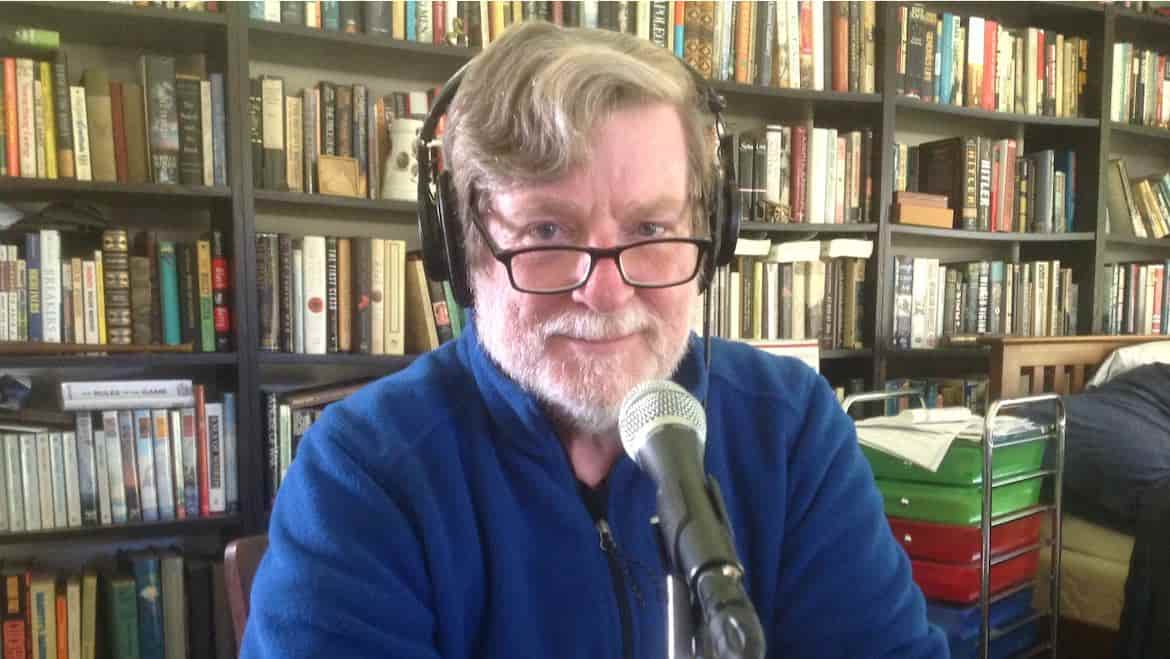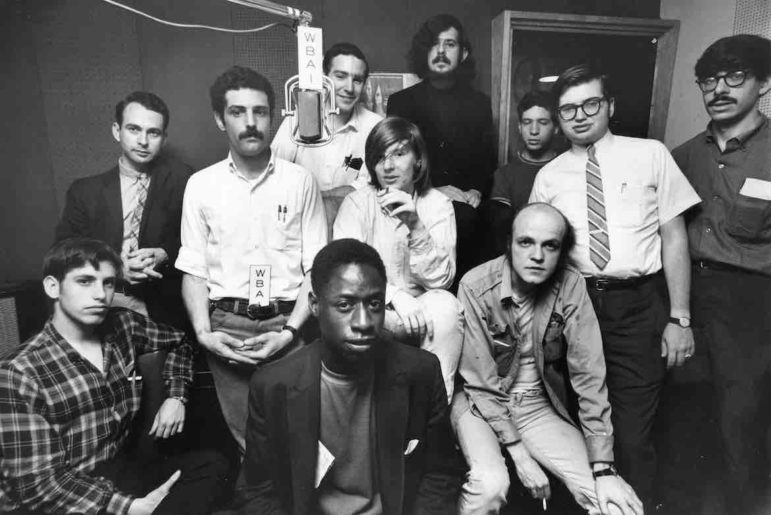Neal Conan, journalist who covered wars and anchored live broadcasts for NPR, dies at 71

Gretel Ehrlich
Neal Conan in his home studio in Hawaii in 2017.
Neal Conan, a journalist who worked in nearly every major news role at NPR during a career that spanned 36 years, died Tuesday after battling brain cancer. He was 71.
His nephew J.J. Sutherland, also a former NPR reporter, confirmed his death.
“Neal did every job you could do in radio. He was terrifically gifted at everything,” said Robert Siegel, retired host of NPR’s All Things Considered, who had worked with Conan at a commercial radio station in New York City before joining NPR. When Siegel signed on with ATC in 1977, he brought Conan with him as a line producer.
Siegel remembered Conan as the first person he worked with who knew how to produce really good radio with ambient sound and actuality. He was also a voracious reader with eclectic interests. “He had a masterful knowledge of military history, comic books and baseball,” he noted.
From his first role with ATC, Conan went on to serve as NPR’s correspondent in New York City then London. He covered the first Gulf War in Iraq, hosted live programs and special coverage and worked in off-mic roles as EP of ATC, foreign editor, managing editor and news director.
During the waning days of the 1991 Gulf War, Conan was among a group of journalists who were captured by the Iraqi Republican Guard and detained for a week.
Though Siegel, a good friend of Conan, describes him as “a very funny, quick, talented guy,” NPR colleagues knew him as a tough taskmaster who could be gruff.
“He didn’t suffer fools,” said John Ogulnik, a former NPR producer and editor who worked with Conan when he was at the helm of Talk of the Nation. Conan hosted the talk show from September 2001 until its cancellation in 2013.
During TOTN’s final months on the air, Ogulnik wrote Conan’s billboards every day. The host would “pretty much eviscerate them and rewrite them,” Ogulnik recalled.
Ted Clark, an editor of ATC in the late 1970s, recalled when a production assistant working her first day on the show brought Conan a script. He tore it up and threw it back at her, he said.
“Neal was not warm and fuzzy,” Clark told Current. “He had a very quick temper that I was the recipient of on a few occasions. But it was always about the show. He was a tough boss and held reporters and producers to very high standards.”
Conan began his radio career at age 17 by volunteering at Pacifica’s New York City outlet, WBAI-FM, initially as a board operator and announcer. After he moved into reporting, Conan contributed to WBAI’s coverage of the Vietnam War and the anti-war movement. “At one time I was confident in saying I’d covered more demonstrations than anybody else on the planet,” he told Hana Hou!, the magazine of Hawaiian Airlines.
Conan was among the WBAI alumni who declined to mention their Pacifica roots in official NPR biographies.

During high school, Robert Krulwich, who would also move from Pacifica to NPR, rode the bus with Conan to the elite Riverdale Country School in the Bronx. The school’s mission was to prepare its graduates for college, but Conan decided not to pursue a college education, which Krulwich said was odd.
“Neal was sort of an autodidact,” Krulwich said. “He could learn things on his own fairly comfortably. He was unafraid of that. He’s never particularly lived by the rules that were created around him and for him. He lived by his own [rules].”
Though Conan had shoulder-length hair as a teenager, Krulwich said, “he wasn’t countercultural, he wasn’t a political radical.”
Conan was a close friend of the late Steve Post, the WBAI radio host who went on to a career at WNYC in New York City. In his memoir, Playing in the FM Band, Post wrote about how Conan called WBAI’s listeners into action in September 1971. An employee of Avis in upstate New York had refused to release a rental car reserved by Paul Fischer, then WBAI’s news director, who was on his way to cover what would become a bloody uprising at Attica State Prison.
“As a public service Conan offered the telephone number of Avis’ Albany offices,” Post recounted. “Half an hour later Fischer was on his way in a shiny new Dodge Swinger. The telephone lines at Avis’ Albany offices remained tied up for two hours, at which time they phoned WBAI and begged that we call off the dogs.”
War zone reporting
The following spring, in April 1972, Conan and Fischer travelled to Northern Ireland to cover violent clashes between Protestant loyalists and Catholics. The 91-minute radio documentary they co-produced, A Month of Bloody Sundays, won a 1972 Overseas Press Club Award.
During that visit to Northern Ireland, Conan and Fischer were in close proximity to a number of bombings. On April 8, 1972, the two journalists were outside the Europa hotel in Belfast, which had been evacuated under a bomb threat. When the bomb went off, they each had tape rolling from opposite ends of the street.
Some 20 years later Conan had another harrowing experience covering armed conflict when he, along with Chris Hedges of the New York Times, was captured by the Iraqi Republican Guard near the end of the 1991 Gulf War. Conan and Hedges were looking into reports of a Shia rebellion centered in Basra, Iraq, when they were detained.
The two were among three dozen journalists who were captured and eventually corralled in a Baghdad hotel before being turned over to the International Committee of the Red Cross and bussed to Jordan.
When Conan returned to the U.S. he resisted pressure from NPR news brass to get the story of his ordeal on the air as soon as possible.
“He felt tremendously indebted to Chris [Hedges] and didn’t want to step on his telling of the story,” recalled Siegel. “He would not scoop Hedges on that. He just wouldn’t do it. It was a measure of character and loyalty to somebody who helped him stay sane and alive during a pretty frightening experience.”
“He seemed to have changed after he was captured by the Iraqis,” Ogulnik said. “I felt that he was a more patient person, a little more gentle.” Ogulnik worked with Conan on live coverage of the political parties’ national conventions in the 1990s and the Clinton impeachment hearings in 1998.
Conan was studious in preparing for live broadcasts. “You knew Neal was studying his briefing book, reading up on everyone who was [a guest] that day,” said Ogulnuik. “When Neal was sitting at the anchor desk, you knew things were under control.”
When TOTN went off the air, Conan declined an offer to become an “elder statesman” on Here & Now, the magazine that NPR co-produced with Boston’s WBUR as the talk show’s replacement. Instead, he bought a home on Kohala Mountain in Hawaii, where he began producing Pacific News Minute for Hawaii Public Radio. The series of under–two-minute voicers featured analysis of military and political developments in the Pacific Basin and aired from 2015 to 2019.
In early 2017 Conan launched a radio series and podcast, Truth, Politics and Power, with former NPR colleagues Ogulnik, Sue Goodwin and Argin Hutchins. The interview series was initially funded by an HPR listener. More than 80 stations aired it on occasion, and NPR added the show to its SiriusXM channel.
In April, former TOTN staffers held a Zoom reunion so that former colleagues could say goodbye to Conan, who had told friends of his terminal illness in a Facebook post. Ted Koppel, former host of ABC News’ World News Tonight, joined the call and praised Conan’s abilities as an interviewer.
“I’ve done a few interviews over the years and I must tell you, Neal, I have never come across anyone who is a better interviewer than you are,” Koppel said. “Whether it was baseball or politics or foreign affairs — whatever subject you had me on to talk about — I always had the feeling that you knew more about it than I did.”
‘On stage, smiling and grooving’
Conan channeled his skills as a broadcaster in pursuing his personal interests.
Before joining TOTN, Conan took a leave of absence to work as the play-by-play announcer for the Aberdeen Arsenal, a minor league baseball team in Maryland.
“It wasn’t going to help his career to suddenly become a … baseball announcer. He just knew that that was what he wanted to do,” Krulwich said.
Conan wrote about the experience in his book, Play by Play: Baseball, Radio and Life in the Last Chance League.
He also collaborated with Ensemble Galilei, a Maryland-based group that performs early music, much of it Celtic. Over 20 years, he read prose and poetry to the group’s musical accompaniment at hundreds of performances around the country.
“His reads were beautiful, and his timing was amazing,” said Carolyn Surrick, a musician and poet who recruited Conan to work with the ensemble. “We got standing ovations all the time. You should’ve seen him up on stage, smiling and grooving on the music. I think he loved it.”
Some of the performances used photos provided by the Hubble Space Telescope Institute and National Geographic. In others, Conan read Surrick’s poems that had been inspired by her experiences playing music for wounded combat veterans at the Walter Reed National Military Medical Hospital in Bethesda.
When Conan toured with Ensemble Galilei, he enjoyed meeting TOTN listeners at post-concert receptions. Sometimes he’d visit local stations and talk with their donors.
When the ensemble was in Cora, Wyo., Surrick introduced Conan to Gretel Ehrlich, a writer who owned a home there. They hit it off right away and eventually married. The couple divided their time between Wyoming and Conan’s home in Hawaii, where they grew macadamia nuts on 5 1/2 acres.
In addition to Ehrlich, Conan is survived by a son and daughter from his previous marriage to Liane Hansen, former host of NPR’s Weekend Edition Sunday.







RIP, our beloved Neal. Your WBAI buddies will always remember you warmly and miss you terribly.
Goodbye again, Neal.
With love,
Leslie
One of the trusted journalists from NPR.
His baseball book was really wonderful. Who stops in the middle of a career and does something like that? I’m glad *he* did.
Despite all the talk of Neil as a tough guy, he was also a Mench. It was really a privilege to work with him for those many decades. Nina Totenberg